Tornerai / J’Attendrai / Komm zurück / Věřím vám / I’ll Be Yours
___________________________________
page originally published on 27 August 2010; latest edit: 10 September 2020
___________________________________
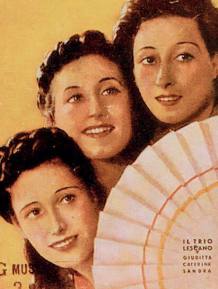 Tornerai is the title of a piece of light music composed in 1936, with music by composer and conductor Dino Olivieri, and words by Nino Rastelli. The Italian title means, in English, “You’ll return.”
Tornerai is the title of a piece of light music composed in 1936, with music by composer and conductor Dino Olivieri, and words by Nino Rastelli. The Italian title means, in English, “You’ll return.”
The song, especially in the French version “J’Attendrai” (“I’ll Wait”), with words by Louis Potérat, became symbolic of the beginning of World War II. “J’Attendrai” was first recorded by Rina Ketty in 1938. In 1943, Rastelli wrote a new Italian lyric. The song has also been recorded with a German lyric under the title “Komm zurück,” with a Czech lyric as “Věřím vám,” and with an English lyric as “I’ll Be Yours.”*
According to Wikipedia, the composition of “Tornerai” is said to have been inspired by the famous coro a bocca chiusa (“humming” chorus) in the opera Madama Butterfly by Giacomo Puccini.
The song appears in the soundtracks of the following films:
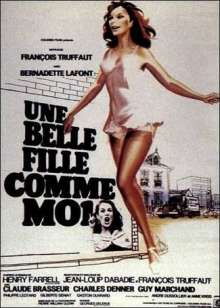 La segunda mujer (1953) – “J’Attendrai”
La segunda mujer (1953) – “J’Attendrai”- Seven of Glory (1968) – “Tornerai”
- Une belle fille comme moi (1972) – “J’Attendrai”
- U-Boot 96 (1981) – “J’Attendrai”
- A Good Year (2006) – “J’Attendrai,” performed by Jean Sablon
- The 13 Roses (2007) – “J’Attendrai”
— above text adapted from the Google translation of the Italian Wikipedia article on the 1937 Trio Lescano single Lasciamoci con un sorriso/Tornerai
________________________
Tornerai
Note, 20 February 2016: The order in which SecondHandSongs.com lists the 1937 recordings of the “Tornerai” suggests that Dino Di Luca recorded the song first, followed by Carlo Buti and then Trio Lescano, in that order. However, Wikipedia says, “[“Tornerai”] was first recorded in 1937 by both Carlo Buti and Trio Lescano (accompanied by the Italian jazz quartet Quartetto Jazz Funaro[3]),[4] and become a huge hit in Italy,” with footnote #4 citing this page. In its page 1937…Tornerai…Forever, IlDiscobolo.net has the early recordings in the following order: Trio Lescano, Carlo Buti, Emilio Livi con il Trio Koln, with the recording by Dino Di Luca left unmentioned. I’ll see if I can sort out the reasons for these discrepancies, and try to provide an accurate chronology of the earliest recordings.
Trio Lescano & Quartetto Funaro — issued in 1937 on the 78 rpm single (Italy) Parlophon GP 92317, as the B-side of “Lasciamoci con un sorriso”
Trio Lescano links:
Ricordando il Trio Lescano (trio-lescano.it)
Trio Sorelle Lescano (ildiscobolo.net)
Quartetto Jazz Funaro links:
ildiscobolo.net (pdf)
trio-lescano.it (pdf)
.
Carlo Buti — issued on (Italy) Columbia DQ 2469, dated 1937 by SecondHandSongs.com
.
Dino Di Luca e Coro, con “Orchestra CETRA diretti dal M°. Pippo Barzizza” — issued in 1937 on (Italy) Parlophon GP 92255
.
Emilio Livi con il Trio Koln — issued in 1938 on Disco Grammofono HN 1319
.
Miriam Ferretti — IlDiscobolo.net indicates that Ferretti’s recording features the new 1943 Rastelli lyric, and dates the recording 1944/45. The side was issued on Columbia D 13041.
.
Orchestra Barzizza — Maestro Pippo Barzizza: an instrumental version, dated 1938 by Il Discobolo.net
.
Claudio Villa — 1958
.
Dalida — 1975 or 1976
______________________________________
J’Attendrai
J’Attendrai — French lyric: Louis Potérat
Rina Ketty — 1938
.
The Quintette du Hot Club de France
The QHCF recorded Tornerai/J’Attendrai twice, the second recording being (I think) the soundtrack for a short film, Jazz Hot (1938?) in which the band performs the song. It is the best film footage of Django performing.
April/May 1938 — newsreel “Jazz Hot” film in Paris, featuring the QHCF: Stephane Grappelli (v), Django Reinhardt (g), Joseph Reinhardt, Pierre Ferret (g), Roger Grasset (b)
.
Anne Clercy (J’Attendrai) — 1938
The provider describes the film footage:
The film shows preparation for the war in France, the invasion of Poland, the outbreak of war in France and invasion of Paris, images from cultural life, including a picture of Mistinguett and Marika Rökk at the Moulin Rouge as well as images of the controversial trip of some of the biggest French movie stars to Germany.
.
Jean Sablon avec Wal-Berg et son Orchestre — 1939(?)
.
Tino Rossi — 1939
Wikipedia profile:
Tino Rossi (29 April 1907–26 September 1983) was a singer and film actor of Corsican origin. Born Constantino Rossi in Ajaccio, Corsica, France, he became a tenor of French cabaret and one of the great romantic idols of his time. Gifted with an operatic voice, a “Latin Lover” persona made him a movie star as well. Over his career, Rossi made hundreds of records and appeared in more than 25 films, the most notable of which was the 1953 production, Si Versailles m’était conté directed by Sacha Guitry. His romantic ballads had women swooning and his art-songs by Jules Massenet (1842–1912), Reynaldo Hahn (1875–1947), and other composers helped draw sold out audiences wherever he performed [read more].
______________________________________
Komm zurück – German lyric: Ralph Maria Siegel
Michael Jary mit seinem Kammer-Tanzorchester, und Gesang: Rudi Shuricke — (as “Komm’ Zurück!“) released in 1939 on Odeon O-31 618, b/w “Melodia (Hörst Du Mein Heimliches Rufen?)”
The following two different recordings, each attributed to Michael Jary under the same 1939 Odeon catalog number, have been posted at YouTube.
.
.
Michael Jary mit seinem Tanz-Orchester, Refraingesang: Rudi Schuricke — Odeon, 1939 (according to the provider) — This is the same recording as the second one above.
.
Hans Rehmstedt mit seinem Orchester – Refraingesang: Horst Winter — Columbia label, 1939
.
Rudi Schuricke und Heinz Munsonius – Imperial label, 1939
.
Rudi Schuricke — 1940
______________________
Věřím vám — Czech lyric: Karel Kozel
R. A. Dvorský — date unknown
.
Oldřich Kovář with Orchestr FOK (Prague Symphony Orchestra) conducted by Vl. A. Vipler — date unknown
________________________________
The Italian Wikipedia article on Tornerai claims that the song, which version is unspecified, became part of the repertoires of Frank Sinatra and Bing Crosby. I’ve been unable to verify this claim with respect to Sinatra. The comprehensive Frank Sinatra Sessionography at steve-albin.com lists no recording under either of the two major titles, “Tornerai” and “J’Attendrai.” I’ve also found no evidence that Sinatra recorded the English lyric version “I’ll Be Yours.” The song “I Will Wait for You,” of which Sinatra’s version may be the best-known English version, is an unrelated composition, originally with French lyrics, published in 1964.
Bing Crosby, on the other hand, recorded an English version of the song on 18 December 1945, under the title “I’ll Be Yours (J’Attendrai),” with Camarata and his Orchestra. “I’ll Be Yours,” with a lyric by Anna Sosenko, had previously been recorded by Hildegarde, earlier in 1945. The Crosby recording was released on the 78 rpm single Decca 23510, b/w “We’ll Gather Lilacs.”
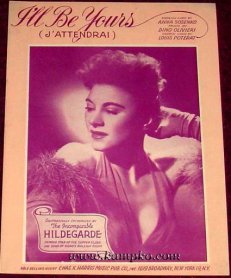 I’ll Be Yours (m. Dino Olivieri, w. Anna Sosenko)
I’ll Be Yours (m. Dino Olivieri, w. Anna Sosenko)
Hildegarde recorded the song on 28 April 1945, according to the Hildegarde discography at keepingscore.x10.mx, and the recording was issued that year as the B-side of the single Counting the Days, Decca 23423.
Of Anna Sosenko, Wikipedia notes that she is
perhaps best known as a manager and writer for Hildegarde for whom she wrote “Darling, Je Vous Aime Beaucoup.” She worked with Hildegarde for twenty years and was her companion before the two broke up in the 1950s.[2]
_______________________
.
Jack Smith — radio broadcast transcription; from the 14 December 1945 Jack Smith Show, with orchestra directed by Earl Sheldon, according to the video provider — In the introduction, Smith indicates that he had previously made one of the first commercial recordings of “I’ll Be Yours.”
.
Bing Crosby and Camarata and his Orchestra — recorded on 18 December 1945; issued on the 78 rpm single Decca 23510, b/w “We’ll Gather Lilacs” (Ivor Novello)
______________________
*The various adaptations are not limited to those I’ve included in this page. Regarding versions of “Tornerai” in languages other than the original Italian, Wikipedia says (highlighting added):
The French version of this Italian song became so well known across Europe that it was often called “J’attendrai” even when recorded instrumentally, such [sic] the two versions recorded by Django Reinhardt and Stéphane Grappelli in 1938, or referred to as the original source when sung in other languages, such as Richard Tauber‘s British “Au revoir” (1945, with lyrics by Bruce Sievier) and Bing Crosby‘s and Hildegarde‘s American “I’ll Be Yours” (both 1945 with lyrics by Anna Sosenko).
There were also German versions (“Komm zurück,” lyrics by Ralph Maria Siegel), sung by both Rudi Schuricke and Horst Winter on recordings made in 1939.[4] The song became known in Denmark as “Kun for dig” (1939, lyrics by Victor Skaarup); in Norway as “Kun for deg” (1939); in Sweden as “Blott för dig’” (1940, lyrics by Tor Bergström); in Poland as “Czekam cię” (recorded in 1939 by Mieczysław Fogg with lyrics by Andrzej Włast); in Czechoslovakia as “Věřím vám” (recorded by both Rudolf Antonín Dvorský and Oldřich Kovář with lyrics by Karel Kozel); and in Lithuania as “Ak, sugrįžk” (with lyrics by Adelė Lenartavičienė).


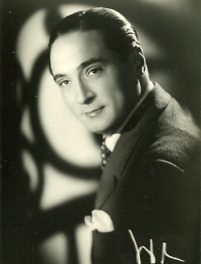
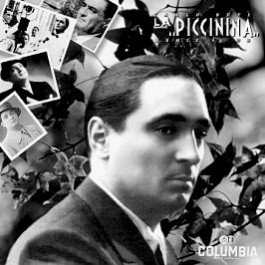
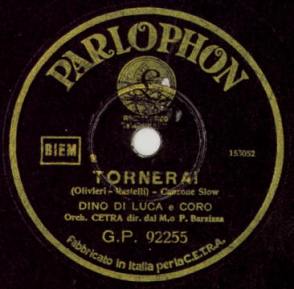
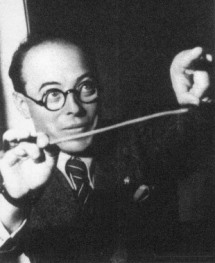


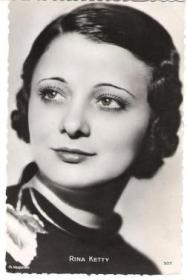
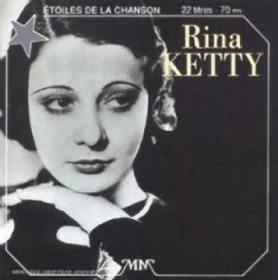
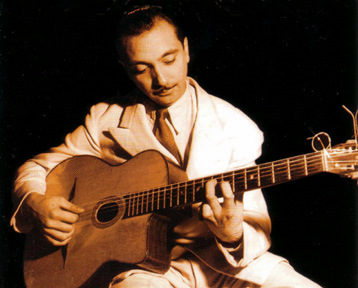
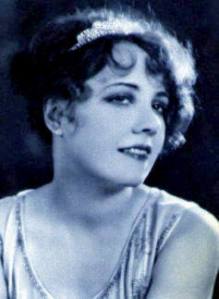
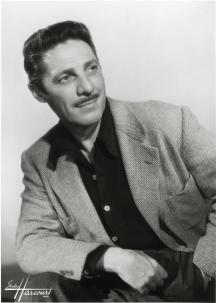
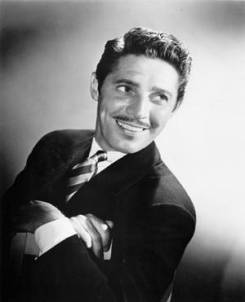
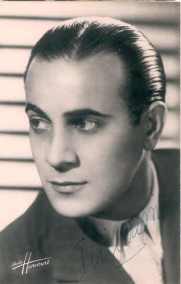
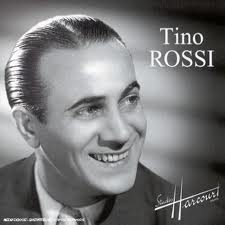
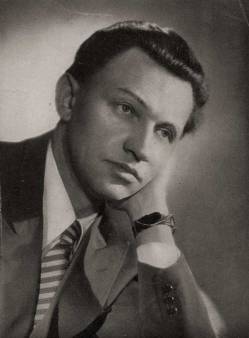
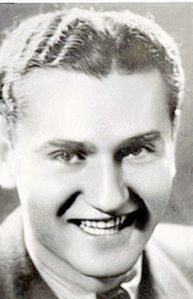
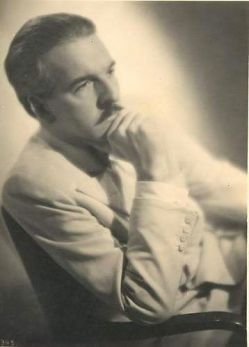
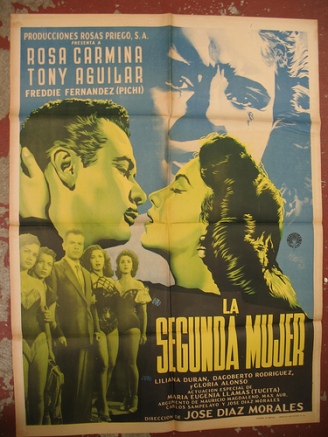



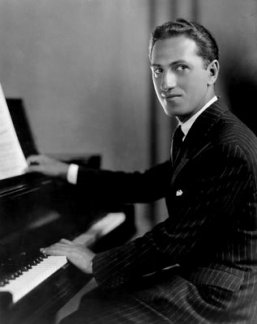

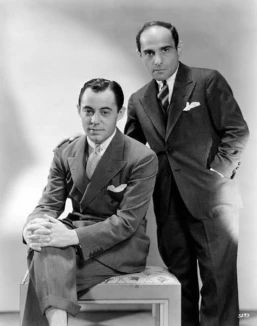

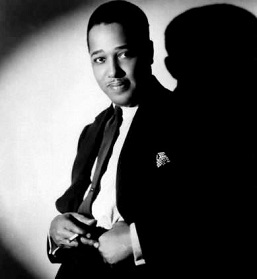


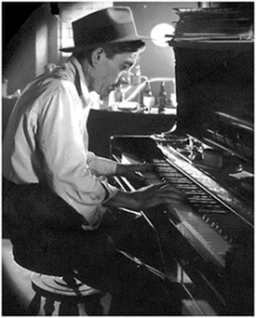
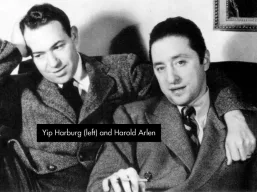
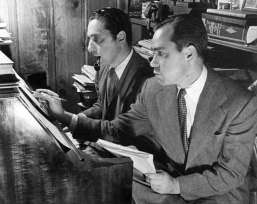



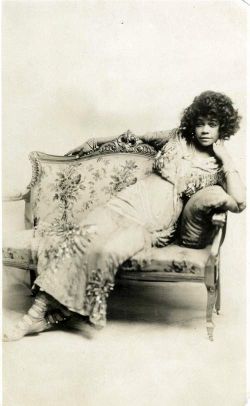





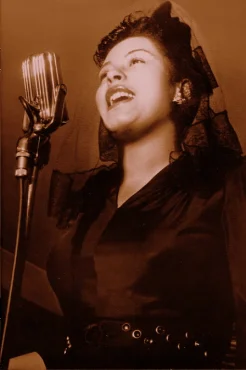




Sep 15, 2011 @ 10:32:55
very interesting, I thought I had all known recordings of J’Attendrai, didn’t realise the continental recordings were so numerous. I have recordings of all the English records both J’Attendrai & Au Revoir, plus many private recordings , organists , pianists, and small group plus Fair ground organs.
LikeLiked by 1 person
Dec 07, 2013 @ 20:03:55
I Need Lyrics and Music in French for J’Attendrai
LikeLiked by 1 person
Dec 08, 2013 @ 22:47:10
You can buy sheet music (Stephane Grappelli arrangement?), which includes words in English and French at musicnotes.com, for $5.25. A note at the link says “Purchase includes digital copy + 1 print”.
If that isn’t what you’re looking for I’d suggest Google searches on “J’Attendrai” + “sheet music” for the sheets. Lyrics are typically easier to find. Here are some options:
Paroles-Musique.com (as recorded by Tino Rossi)
ParolesMania.com (Tino Rossi)
MetroLyrics.com (as recorded by Dalida in 2006)
LikeLike
Apr 07, 2014 @ 10:25:07
Excelente blog!!! Felicitaciones por esta maravillosa investigación. La música, las canciones y la cultura a través del tiempo. Gracias!
LikeLiked by 1 person
Apr 12, 2014 @ 14:15:07
alvaroriccardi,
Gracias! Es muy amable de tu parte.
LikeLike
Dec 04, 2016 @ 06:45:09
The latest version of j’attendrai that i know of is by Hot Club Sandwich. I would like to get sheet music for clarinet. Thanks! For the background and videos!!!!
LikeLiked by 1 person
May 28, 2017 @ 17:24:52
LikeLike